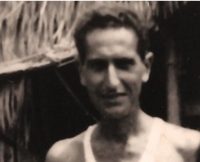What a morning! At dawn, half-asleep in my hotel room, I hear the voice of Mrs Smith, my neighbor, and make out the words “Japan” and “Honolulu”. Her tone is very excited and I immediately guess that war must have broken out! I get dressed quickly and go and find her. She tells me that the Japanese have bombed Honolulu.
Nothing about the attack in the Bulletin, but it has been announced on the radio.
I go to the High Commissioner’s office with a request to withdraw some money, but no one is allowed in and I leave my application with a security man. One can feel the excitement in the streets. The bridges over the Pasig are being guarded. Lots of military trucks. Crowds gathering in front of Japanese stores –one, the Nippon Bazaar, is still open with its window full of streamers wishing Merry Christmas and a Happy New Year. Ironic.
Go to find G. who tells me that at the first naval encounter, the Anglo-Saxons will annihilate the Japanese fleet! And that the Japanese are very divided amongst themselves. I’m not so optimistic and tell him that we’re in for a hard time.
I go to the YWCA [Young Women’s Christian Association] around ten o’clock and find T., very calm. She tells me that Davao and Baguio have been bombed this morning. I can’t believe Baguio has been bombed but the radio confirms this surprising news.
Baguio! I had stayed there for a couple of weeks not long before. A clean little town, 1500 meters up, surrounded by pine trees, like its Indochina twin, Dalat. Baguio was the ideal place to be in wartime, far from the coast, far from the major towns and main means of communication, accessible only by a steep road zigzagging along deep ravines in the gold-mining region. It’s to Baguio that the Americans went to relax and take in the clean, scented air of the pines for ever soughing in the fresh breeze. Baguio used to be considered a place of refuge, and now this peaceful little town had become a target.
The authorities are urging the population to evacuate the city, and the streets are full of vehicles overloaded and
overflowing with baggage.
I meet an elderly American who says to me, “I suppose we’ll have to take it.”
